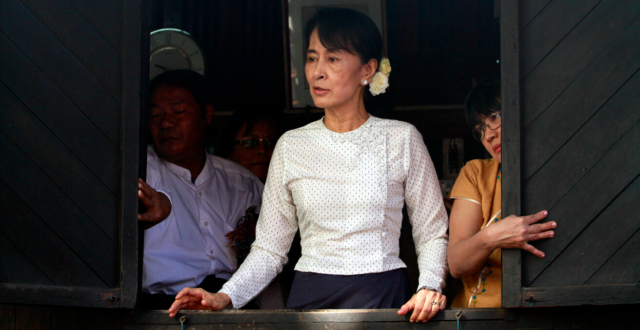Myanmar’s Kangaroo Courts Hand Aung San Suu Kyi Another Six-Year Term While Sean Turnell Pleads Not Guilty


Myanmar’s junta continues to pursue a baseless campaign against former leader Aung San Suu Kyi in the nation’s courts. But many others, like Sean Turnell, an Australian academic and advisor to Suu Kyi, have been caught in the political crossfire.
On 15 August a special military court in Myanmar sentenced former government leader Aung San Suu Kyi to six years in prison for corruption, adding to the eleven years she was already serving. Given she is 77 years old, she will likely spend the rest of her life in detention if she serves these terms. But the military junta is not finished with her yet.
She has been charged with at least 20 offences, including election fraud, corruption, and violating the Official Secrets Act. Very little is known about the cases since the trials take place in a closed court and her legal representatives are banned from talking to the media.
After being deposed by a military coup in February 2021, Suu Kyi has spent most of the last year in an unknown location. In June, however, the military junta announced that she had been transferred to a prison compound in the isolated capital, Naypyidaw, and kept in solitary confinement.
Sean Turnell, an Australian academic who was a close adviser of Suu Kyi, is also trapped in Myanmar’s partisan courts. As with Suu Kyi, he is charged with violating the Official Secrets Act and is being held in the Naypyidaw prison.
On 11 August he faced court for the first time since his arrest eighteen months ago and pleaded not guilty to the charges. As with Suu Kyi his lawyers are unable to discuss the case and no details have been publicised.
But it matters little what both Turnell and Suu Kyi plead during the court proceedings, nor what fabricated or fanciful evidence is deployed in their conviction. The junta has complete control of the courts with the judiciary beholden and loyal to the military.
The aim of these cases is therefore not to establish guilt or innocence, or to seek justice. The guilty verdicts are predetermined. They are purely political kangaroo courts designed to sideline Suu Kyi from national politics for as long as the military considers it convenient.
Turnell, as Suu Kyi’s close adviser, is collateral damage although he also serves as a useful bargaining chip for negotiations with the Australian government, which, almost alone amongst Western countries, has not sanctioned coup leader Min Aung Hlaing.
The junta’s brutality and lack of regard for international norms and opinion was on show again in July when it executed four pro-democracy activists. The junta appears unable to act strategically in their own best interests, having alienated almost all potential allies, both domestically and internationally.
The usually quite accommodating governments of ASEAN have increasingly criticised the regime and Russia, Myanmar’s main military supplier, barely registered a visit from Min Aung Hlaing. The military is facing legal jeopardy in international courts which are gradually clearing the paths towards prosecutions for genocide and other crimes against humanity.
The junta’s brutal country-wide pacification strategy continues, with a recent assault on a village in Sagaing Region that included airstrikes from Mi-35 fighter jets and 60 soldiers dropped by helicopters. The bodies of 18 civilians were found after the attack, including a ten-year-old girl.
Pro-democracy militias face off against the junta’s jets and choppers around the country with rifles and homemade explosives, although their local knowledge, particularly in the mountainous border regions, provides an advantage over the predominantly lowland military.
The junta have over 12,000 political prisoners in detention and the prospects for the country and its people are bleak.
The coup and its repercussions have undone a decade of reforms, which, while imperfect, transformed Myanmar. The country that the military took hostage in February 2021 is entirely different to that which existed prior to 2011, when the political and economic reform process began.
While some ethnic groupings, notably the Rohingya, suffered appalling privations during the reform era, most of the country enjoyed freedoms that had never been experienced, or at least not for the preceding five decades under military rule.
After the coup Myanmar is very reminiscent of its pre-2011 state, only this time with mobile phones.
Academics and NGO workers endeavouring to support democracy and the people of Myanmar through local groups once again find themselves consigned to Thailand or Myanmar’s ethnically-controlled border zones; the “liberated areas” beyond the control of Myanmar’s military that were the bread and butter of activist research prior to 2011.
When I was last in Myanmar, before COVID-19 and the coup, I caught up with Sean Turnell in Naypyidaw. He was, as always, amiable, humorous, and generous with his time. His hectic schedule as adviser to Suu Kyi and the government was chock full, addressing ten percent inflation along with “banks, money laundering, sanctions and the Chinese.” These issues seem almost trifling compared with the challenges now facing Myanmar’s people.
While the Australian government and population should do everything in their power to support the democratising forces of Myanmar in general, as an Australian citizen, Sean’s grim predicament in Myanmar’s Kafkaesque court system must also not be forgotten.

